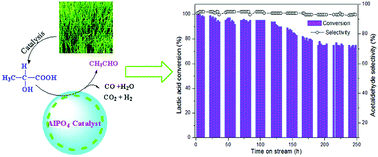
Acetaldehyde is needed by the chemical industry for many diverse applications, such as paint and cosmetic formulations, plastics and construction materials. As such there is a need for renewable acetaldehyde within the bio-based economy and bio-ethanol can be oxidised to give acetaldehyde for this purpose. Now an alternative process using lactic acid as a feedstock has been developed.
The catalyst for this transformation is a mesoporous aluminium phosphate, facilitating full conversion of the lactic acid and yields of acetaldehyde exceeding 90%. While the use of aluminium is very favourable compared to ethylene oxidation catalysts based on silver for example, the longevity of phosphorus reserves are a concern. However the catalyst is robust and can be used for over 200 hours. Also, the process is efficient at lower temperatures than are often needed for transformations of lactic acid.
Read the advanced article in Green Chemistry online now:
Congming Tang, Jiansheng Peng, Xinli Li, Zhanjie Zhai, Wei Bai, Ning Jiang, Hejun Gao and Yunwen Liao
Green Chem., 2015, Advance Article. DOI: 10.1039/C4GC01779J










